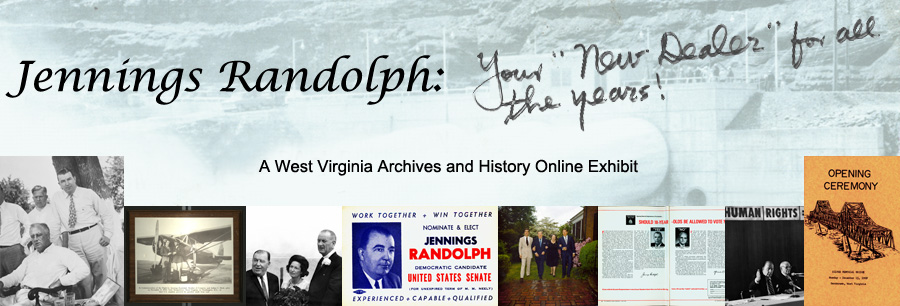
Chapter Three
|
"We must be alert to take every advantage of the air, to fill the heavens with pilots and with planes…And with an aeronautical industry thus assured, we may face the future with confidence." - Jennings Randolph |
|
After fourteen years in the House of Representatives, Jennings Randolph lost his bid for reelection in 1946 to Melvin Snyder, a Republican from Preston County, by 2,183 votes. After this loss, many new career opportunities arose for Randolph.

Jennings Randolph with unidentified, receiving honorary degree from Southeastern University, June 1940
|
Following the election, Randolph and his family decided to remain in the Washington, D.C. area since both sons, Jennings, Jr. (Jay) and Frank, were enrolled in local schools. Randolph had been teaching public speaking at Southeastern University on a part time basis since 1936, and he continued to fulfill his role as adjunct professor after losing his seat in Congress.1 In 1952, Randolph became Dean of the College of Business and Financial Administration at Southeastern University, a position that he held until 1958.
|

Jennings Randolph, Association of Airport Executives/American Road Builders Association Convention, Chicago, April 1948
|
In addition to teaching part-time, the energetic Randolph decided to indulge his passion for aviation when he became the presidential assistant for Capital Airlines in Washington, D.C. in February of 1947. In this role, he served as the spokesman for expanding commercial air travel, giving several speeches around the nation intended to boost interest in the various benefits of the fledgling enterprise. |

Jennings Randolph with unidentified, Capital Airlines plane, c. 1950s.
|

Jennings Randolph at the Democratic National Convention, Philadelphia, July 1948
|
Ever the politician, Randolph remained active in the Democratic Party after his 1946 defeat. From 1948 to 1952, he served as a delegate-at-large to the Democratic National Convention, maintaining his political ties and using them to influence legislation on goals he worked toward during his time in the House of Representatives.
|

Jennings Randolph Campaign Card, 1958
On January 18, 1958, Senator Matthew Neely (D – WV) passed away, leaving a vacant seat in the United States Senate. After Neely’s passing, Governor Cecil Underwood appointed Republican John Hoblitzell to fill the vacancy until the state could hold a special election. Randolph formally entered the race for the Senate seat on January 27th with the remark, "I am a working Democrat not associated with factions, and it is my belief and hope that citizens generally within the party will welcome my entry. I cherish this support."2 At the same time he announced his candidacy, he declared he would resign his position with Capital Airlines on April 1st to "wage a vigorous campaign."3 Randolph defeated former Governor William Marland in the primary election for the Democratic nomination, then went on to defeat Hoblitzell in the general election. That same year, Robert C. Byrd won a seat in the U.S. Senate. Being elected by special election, however, Randolph took office right away, making him Byrd’s senior by just a few weeks.4
|

Letter by Jennings Randolph asking for political support, 1958
|

Richard Nixon swearing in Jennings Randolph and Robert C. Byrd, January 3, 1959
Citations
1. Robert B. Florian, "Mr. Randolph: The Gentleman From West Virginia," p. 143, Florian Collection, WVSA.
2. Randolph Enterprise-Review (Randolph County). "Jennings Randolph To Run for U.S. Senator: Seeks Seat Formerly Held by Late Senator M.M. Neely." January 29, 1958, 1.
3. Ibid.
4. David Stout, “Senator Jennings Randolph of West Virginia Dies at 96.”
|



